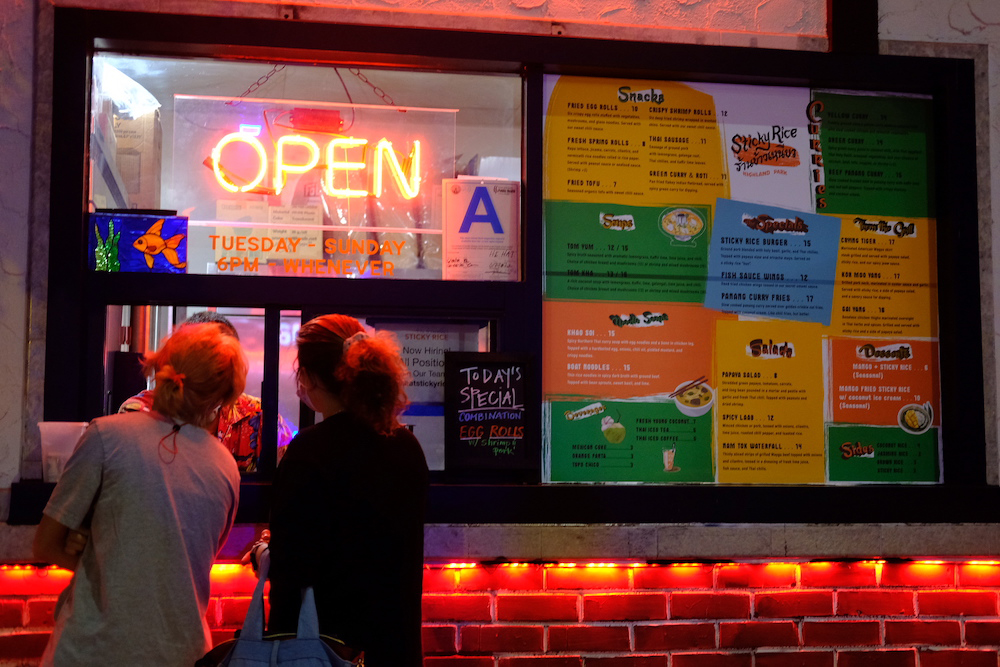Throughout the pandemic, small businesses of all kinds have struggled to adapt and stay afloat. Now, the return of Occidental students is having a significant impact on both businesses within NELA, like Delia’s Restaurant and Scoops ice cream parlor, as well as Occidental’s food suppliers, which have had to readapt to the return of full campus dining operations.
Delia’s Restaurant:
Delia’s Restaurant, located on the intersection of York Boulevard and Avenue 45, is a family-owned Mexican diner that opened its doors in 2002. The restaurant is owned by Adolfo and Delia Flores and managed by their son, Mark Flores.
“I felt like [Occidental students have] been trickling in slowly the past couple weeks,” Mark Flores said.
According to Flores, this is an encouraging sign for small businesses, which have had to withstand the crippling economic impacts of the global pandemic, particularly on the food industry. He said the economic downturn hit Delia’s hard, but that the NELA community did its best to show solidarity.
“I feel like everybody knows it’s like a family-run business so they really tried to support [Delia’s] as much as they could,” Flores said.
Flores said he estimated that 40 percent of Delia’s business came from Occidental students. Already, he has seen an uptick in Delia’s sales with students back on campus.
“Having you [Occidental students] there is just a little boost, to not have us be stressed about sales and everything,” Flores said.
Scoops:
Scoops, located on York Boulevard, is an ice cream shop owned by Tai Kim that has had called Highland Park home since 2012. Known for its unique ice cream flavors, this small business is yet another that was impacted by the pandemic.
According to Brent Anthony, a Scoops employee, the ice cream shop saw a significant drop in revenue during the first months of the pandemic compared to the year before.
“The focus was just surviving. Staying healthy, and let’s just get by,” Anthony said.

Without sales from Occidental students, the business relied heavily on other frequent customers. Since the College’s return to in-person instruction, there has been an increasing presence of Occidental students at Scoops, and several students have already become regulars at the shop, according to Anthony. He said one student told him she had been waiting eighteen months to return to Scoops and was thrilled to be there again.
Anthony said though business has increased with the loosening of restrictions and improving vaccination rates, sales are still not back to what they were. Scoops is only collecting about 75 percent of the sales it did in 2019, according to Anthony. The rate of sales has not been predictable either — some weekends have been busy while others have been idle.
“It’s hit or miss,” Anthony said.
Campus Dining Suppliers:
Food suppliers for Occidental are working to adapt to the school’s in-person operations. According to Associate Director of Campus Dining Robert Starec, impacts to the global supply chain caused by layoffs during the pandemic have made it difficult for suppliers to respond to the increased demand that has come with students’ return.
Starec said the suppliers adapted to the economic downturn caused by the pandemic in different ways. Some had to lay off employees while others attempted to transition their business model to supply only restaurants rather than schools. Now, they must adapt again.
“If they had to furlough employees, now it’s hard to get those people back. Some products aren’t being manufactured,” Starec said. “If they are being manufactured, there’s been a disruption in having those products be able to be shipped. If they’re shipped and received, then there’s no drivers to get it to the warehouses.”
According to Starec, many suppliers have not been able to bring the size of their deliveries back to pre-pandemic levels. Red Shell Sushi — an LA-based caterer that used to deliver to Occidental six or seven days a week — can now only manage deliveries on Tuesdays through Thursdays, Starec said, since they simply do not have enough drivers to cover more deliveries. Occidental can now only serve about half of the varieties of sushi they did previously. Moreover, Starec said an uptick in the price of fish has forced prices to increase as well.
The timing of the food deliveries has also become irregular since the return of students, Starec said, and local suppliers are struggling to reorganize their distribution.
“Now we’re pretty much at the mercy of whatever they can provide when they can provide it,” Starec said. “We give them our request and we don’t know exactly what day that product is going to arrive. When it does arrive, we have no way to guarantee that the entire order is going to arrive. If we get 50 percent, we’re fortunate.”
The Occidental dining staff has had to scramble to coordinate with various suppliers and dining facilities to patch together its meal stock as smoothly as possible, according to Starec.
“Whatever we don’t get one day we try to get it from another supplier the next day,” Starec said. “And if we can make that appear seamless and not a disruption to the students, then we’ve done our job.”
![]()































